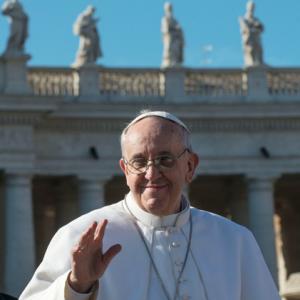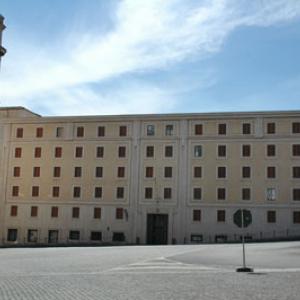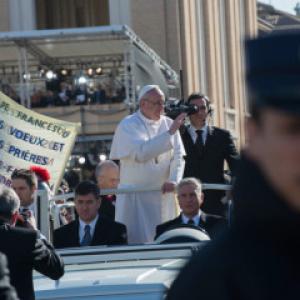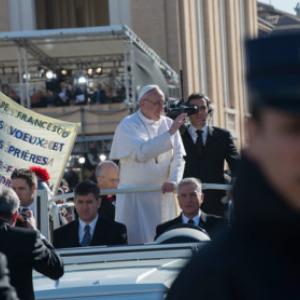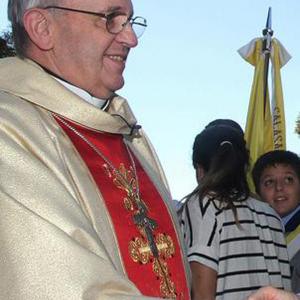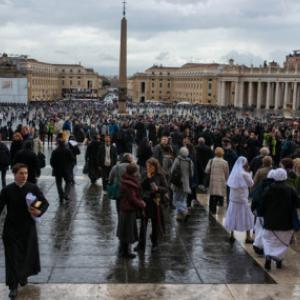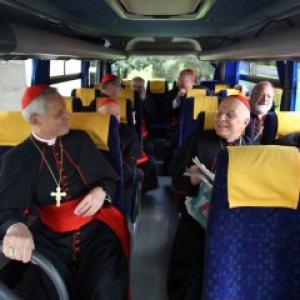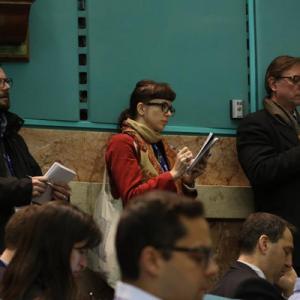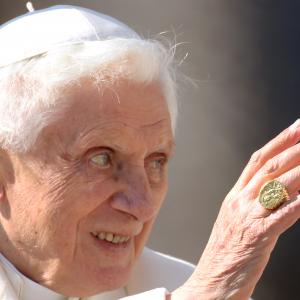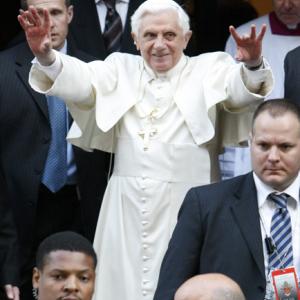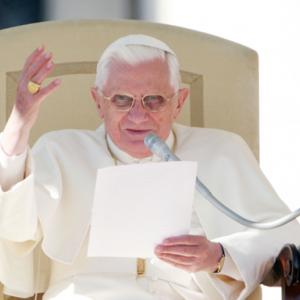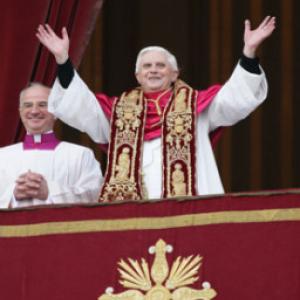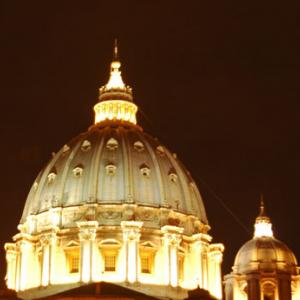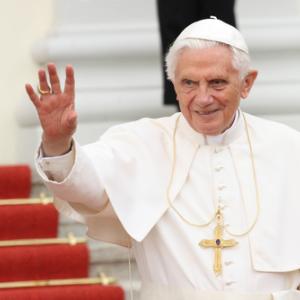Alessandro Speciale writes for Religion News Service.
Posts By This Author
Pope Francis Calls on Catholics to Leave Their Comfort Zone
In his first general audience since his election to the papacy, Pope Francis on Wednesday urged Catholics to leave their comfort zone to search for “lost sheep.”
As the Catholic Church prepares for Easter and celebrates the rites of Holy Week, Francis told around 20,000 people in St. Peter’s Square to avoid “a tired and routine way of living the faith,” and resist “the temptation to withdraw into pre-established patterns that end up closing our horizon” to God.
“We must not be content to remain in the enclosure of the 99 sheep; we have to step outside, to search for the lost sheep,” he added, referring to a parable of Jesus.
Pope Francis Shuns Papal Apartment in Favor of Smaller Guesthouse
VATICAN CITY — Shunning the spacious papal apartment used by his predecessors, Pope Francis has chosen to continue living in the Vatican guesthouse where he has been staying since the beginning of the conclave.
The Vatican’s chief spokesman, the Rev. Federico Lombardi, explained on Tuesday that Francis will live “until further notice” in a suite in the Santa Martha Residence, a modern Vatican guesthouse for priests and bishops who work in the Roman Curia or who are visiting the Vatican for meetings and conferences.
Francis made his intentions clear on Tuesday morning, while celebrating Mass in the residence’s chapel for its permanent guests, who occupy about half of the residence’s 130 or so rooms.
The pontiff’s choice is a consequence of his desire to adopt a “simple” living arrangement that allows him “to live in community” with other priests and bishops, Lombardi explained.
Pope Francis Calls for Intensified Dialogue with Muslims
VATICAN CITY — Pope Francis on Friday called for more intense dialogue between religious leaders, particularly Muslims, as he tries to recalibrate relations between the world’s two largest religious groups.
Speaking in the Vatican’s majestic Sala Regia, the Argentine pontiff said that part of his mission is to connect “all people, in such a way that everyone can see in the other not an enemy, not a rival, but a brother or sister.”
In a meeting with Vatican diplomats and foreign leaders, Francis also reaffirmed the church’s commitment to protect the poor and the environment, an early theme in his young pontificate.
“Fighting poverty, both material and spiritual, building peace and constructing bridges: these, as it were, are the reference points for a journey that I want to invite each of the countries here represented to take up,” the pope said.
At Inaugural Mass, Pope Francis Calls for Defending Environment, Poor
VATICAN CITY — Pope Francis issued a powerful call for the protection of the environment and of society’s most vulnerable during his formal installation Mass at the Vatican, while qualifying his papal power as a “service” to the church and to humanity.
The pope on Tuesday celebrated a solemn Mass in St. Peter’s Square in front of an estimated 200,000 people, as well as political and religious leaders from all over the world.
During the Mass, Francis received the symbols of his papal authority over the world’s 1.2 billion Roman Catholics: the pallium, a lamb’s wool stole that recalls Jesus as the Good Shepherd, and the “ring of the fisherman.”
In keeping with the low-key style that has been the hallmark of his pontificate so far, Francis presided over a somewhat simpler, and definitely shorter, rite than the one that marked the start of Benedict XVI’s reign in 2005.
Francis was slowly driven around a sun-drenched St. Peter’s Square in an open-top car, shunning the bulletproof, air-conditioned popemobile preferred by his predecessors. At one point, he asked to stop the car and got out to bless a disabled person.
In his homily, delivered in Italian, Francis described the church’s mission as “respecting each of God’s creatures and respecting the environment in which we live.”
Argentine Cardinal Jorge Mario Bergoglio Elected as Pope Francis I
Argentinian Cardinal Jorge Mario Bergoglio was elected as Pope Francis I on Wednesday, after only two days of voting in the conclave tasked with choosing a successor to Pope Benedict XVI.
According to anonymous reports of the 2005 conclave, he was the leading contender against then-Cardinal Joseph Ratzinger, who became Benedict XVI. Bergoglio, 76, has served as the archbishop of Buenos Aires since 1998 and was made a cardinal in 2001. He is the first Latin American and the first Jesuit to rise to the papacy.
In his first address to the huge crowd that had gathered in St Peter’s Square, Francis asked for the prayers of “all men and women of good will” to help him lead the Catholic Church.
Black Smoke: First Day of Conclave Ends Without New Pope
VATICAN CITY — Black smoke from the chimney atop the Sistine Chapel signaled that the first day of the conclave ended without the election of a new pope.
Even if the first-round outcome was largely expected, thousands of people on Tuesday braved the inclement Roman weather to wait for the result of the vote. They slowly filled up St. Peter’s Square as the evening progressed, with their eyes fixed on the small chimney.
Cries of disappointment erupted from the crowd when the black smoke appeared instead of the white smoke that would herald a successful election.
Cardinals Begin Conclave to Elect the Next Pope
VATICAN CITY — The doors of the Sistine Chapel closed behind the cardinals on Tuesday, marking the official start of the conclave that will elect the successor to Pope Benedict XVI.
The 115 cardinal-electors walked in procession into the Sistine Chapel, singing hymns and invoking the Holy Spirit, before filing under Michelangelo’s “Last Judgment” and taking a solemn oath of secrecy on everything that will happen during the conclave.
At the end of the oath-taking ceremony, the master of papal ceremonies, the Rev. Guido Marini, ordered the “extra omnes” (Latin for “everybody out”).
Cardinals will be sequestered inside a Vatican residence until a candidate receives the two-thirds majority needed for election to the papacy.
Vatican Makes Final Preparations for Papal Conclave
As the Vatican prepares for the opening of the conclave today to elect a new pope, officials announced that the personal secretary of former Pope Benedict XVI will return to Rome for the first time since Benedict’s resignation on Feb. 28.
The Vatican’s chief spokesman, the Rev. Federico Lombardi, confirmed on Monday that Gaenswein will be one of the senior Vatican officials to take part in the solemn procession of cardinals into the Sistine Chapel that will open the conclave on Tuesday afternoon.Archbishop Georg Gaenswein, who was Benedict’s closest aide when he was pope, moved with Benedict to the papal summer residence of Castel Gandolfo when the retired pope left the Vatican on Feb. 28.
His presence will once again highlight the unprecedented situation — and potential complications — of having a retired pope still living just as cardinals gather to elect his successor.
Sistine Chapel Plays a Key Role in Electing a New Pope
As if the task of choosing the Vicar of Christ and the leader of the world’s 1.2 billion Catholics wasn’t daunting enough, the voting must also take place under the gaze of Michelangelo’s brilliant but imposing frescoes in the Sistine Chapel.
That’s what the late Pope John Paul II decreed when he rewrote the conclave rules in 1996, and so it shall be starting today — and for however many days it takes the 115 cardinal-electors to choose a successor to Pope Emeritus Benedict XVI, who retired last month.
In the Sistine Chapel, “everything is conducive to an awareness of the presence of God, in whose sight each person will one day be judged,” John Paul II wrote in his 1996 Apostolic Constitution “Universi Dominici Gregis,” which regulates papal elections.
Vatican: Conclave To Start on Tuesday
VATICAN CITY — The conclave to pick a new pope will begin on Tuesday the Vatican said on Friday, resolving an open question that had dogged the cardinals meeting here over the past week.
The cardinals will celebrate a special Mass “pro eligendo Romano Pontifice” — for the election of the Roman Pontiff — in St. Peter’s Basilica on Tuesday morning, and in the afternoon the cardinals will enter into the Conclave, the Vatican said.
The date was set by the cardinals gathered in a late-afternoon session on Friday. They were scheduled to vote on the decision, but there was no word on how many supported the Tuesday start date or how many preferred an earlier or a later date.
In one of his last acts before resigning on Feb. 28, Pope Benedict XVI amended the law regulating papal elections to allow cardinals to move up the beginning of the conclave, which would normally not be able to start until at least 15 days after a pope dies or leaves office.
Because Benedict resigned — the first pope to do so in 600 years — and announced his plans on Feb. 11, the cardinals did not have to focus on a funeral, as they did when John Paul II died in April 2005. They also have had nearly a month to think about a successor.
As a result, many believed the cardinals did not need to wait long after Benedict’s resignation took effect to begin the conclave itself.
Cardinals Move to Plug Leaks Ahead of Papal Conclave
Tensions among the Roman Catholic cardinals meeting here to choose a new pope appeared to escalate on Wednesday as the American prelates in Rome canceled their daily press briefing under pressure from colleagues who are frustrated over news coverage of their secret talks.
The cardinals also announced that they still had not been able to agree on a start date for the conclave, in which 115 electors will cast their ballots for a successor to Pope Benedict XVI.
The effort to control the flow of information from the daily pre-conclave “General Congregation” meetings marked a sharp reversal from the unprecedented openness that had characterized this first papal conclave of the digital age.
Cardinals Hold First Meeting But Don’t Set Date For Conclave
Roman Catholic cardinals on Monday met for the first of a series of closed-door meetings in the run-up to the conclave that will elect the successor to former Pope Benedict XVI.
But as cardinals filed into a Vatican conference room under the gaze of dozens of cameras, church officials said 12 voting prelates still haven’t arrived in Rome, pushing back the possibility of an early start to the conclave.
Pope Benedict XVI Leaves Office, Promises ‘Obedience’ to Successor
VATICAN CITY — The papacy of Benedict XVI came to a quiet end at 8 p.m. on Thursday, making him the first pope in 600 years to voluntarily leave office.
While there was no formal ceremony to mark the historic passage, the end of Benedict’s papacy and the beginning of the “sede vacante” interim period was clear when the Swiss Guards left their post at the gate of the papal summer residence in Castel Gandolfo.
The Swiss Guards are charged with protecting the pope. When Benedict ceased to be pope, his security was no longer in their hands. At the Vatican, officials sealed the pope’s apartment as prescribed by church law, and will destroy the pope’s ring and official seal in the coming days.
Pope Benedict Defends Choice to Resign in Last Public Address
In his final public address, Pope Benedict XVI on Wednesday forcefully defended his decision to resign while trying to reassure Catholics still reeling from the shock of his unprecedented move.
For the first time since his stunning announcement on Feb. 11, the 85-year-old pope explained at length his decision to become the first pope in six centuries to resign. His tenure officially ends Thursday at 8 p.m. local time.
Benedict admitted that his resignation is a “grave” and “novel” act but, he added, his choice had been made “with profound serenity.”
“Loving the church means having the courage to make difficult, agonizing choices, having ever before oneself the good of the church and not one’s own,” he said.
Benedict Will Be ‘Pope Emeritus’ After Resignation
VATICAN CITY — Pope Benedict XVI will be known as “Pope Emeritus” after his retirement on Feb. 28, and will continue to wear white vestments, the Vatican announced on Tuesday.
Ever since Benedict’s surprise announcement that he would become the first pope in 600 years to resign, there had been wide speculation about seemingly small issues, such as what he would be called or whether he would retain the title of “pope.” Such details, however, carry great symbolical value within the tradition-bound Roman Catholic Church.
The Rev. Federico Lombardi, the Vatican’s chief spokesman, told reporters that Benedict will continue to be called “His Holiness” and that his title will be “Pope Emeritus” or “Emeritus Roman Pontiff.”
He said Benedict had decided the issue himself, after consultations with experts.
Vatican Mulling Changes to Election of New Pope
VATICAN CITY — The Vatican on Wednesday confirmed that Pope Benedict XVI is considering changes to church law regulating the election of a new pope, but stopped short of saying whether voting could start earlier than currently planned.
Pope John Paul II’s 1996 Apostolic Constitution “Universi Dominici Gregis” regulates what happens between the death or resignation of a pope and the election of his successor.
It stipulates that the conclave of cardinals must begin 15 to 20 days after the end of the previous pontificate.
But after Benedict’s surprise announcement that he will resign on Feb. 28, several voices within the church have asked for an earlier start to the voting to shorten the time the Catholic Church is left without a leader.
Who Runs the Vatican After the Pope Steps Down?
VATICAN CITY — As of 8 p.m. on Feb. 28, Pope Benedict XVI will no longer be pope and the Vatican will go into “sede vacante” mode — a Latin expression that means that the seat of St. Peter is vacant.
So who’s in charge until a new pope is chosen? The “interregnum” between two popes is governed by ancient rituals and by institutions half forgotten even within the Vatican.
But it is also the only time that the Catholic Church comes close to vaguely resembling a democracy, with the College of Cardinals acting somewhat like a Parliament with limited powers as it prepares to choose the new pontiff in a closed-doors conclave.
Who’s in the Running for Pope? 12 Names to Watch
Pope Benedict XVI’s sudden announcement that he would resign by the end of the month took the church and the world by surprise, in large part because it was a move without precedent in the modern world.
But what comes next is as old and familiar as the papacy itself: Speculating about who will succeed to the Throne of St. Peter.
Indeed, within months of Benedict’s own election in 2005, church insiders and online oddsmakers were trying to figure out who might be next, given that Benedict — now 85 — was already aging, increasingly frail, and had himself declared that he did not expect his reign to be a long one.
So what will happen when the world’s cardinals gather before the splendor of Michelangelo’s Last Judgment fresco in the Sistine Chapel to elect a new pope? Who are the “papabile,” as the Italians say, the “pope-able” cardinals?
Will the conclave make the epochal break with the European monopoly and pick a cardinal from Latin America or Africa? The Catholic Church is booming in the Southern Hemisphere, as opposed to Europe and North America, where it is on life-support or barely treading water.
Electing A New Pope Draws on Tradition and Secrecy
VATICAN CITY — Pope Benedict XVI will soon become the first pope to resign since 1415, short-circuiting many of the initial stages of electing a new pope. But the Vatican says the transition to a new papacy shouldn’t be all that different from normal.
Of course, the traditional rituals associated with confirming the death of a pope and planning his funeral will not be necessary. But the process outlined below, rife with secrecy and tradition, will largely follow centuries-old protocol.
What Happens Next at the Vatican
Following is a brief explanation of the process used in a conclave to elect a new pope.
Q: Who governs the church until a new pope is elected?
A: Day-to-day operations are handled by the Vatican curia, the central bureaucracy. All prelates who head Vatican agencies resign after the death or resignation of a pope. Provisions are made to oversee the papal household, the spiritual needs of Romans and to grant absolutions.
Q: What does the word “conclave” mean?
A: The word comes from the Latin, “with a key,” referring to the tradition of locking the doors until cardinals elect a winner.
Q: Who is eligible to be elected pope?
A: Technically, any baptized male Catholic is eligible, provided he is not married and in good standing with the church. Since 1378, however, new popes have come from within the College of Cardinals.
